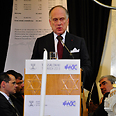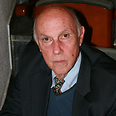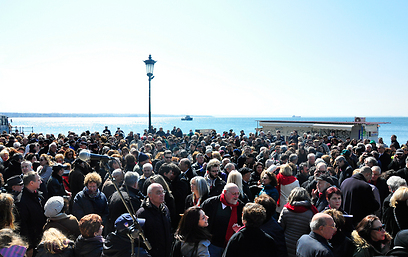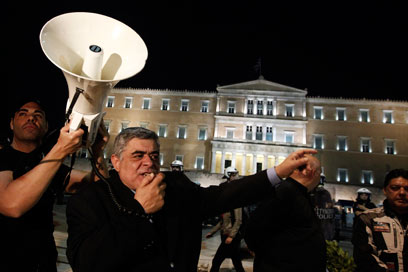

Diaspora Report 2013: Jews of Greece versus Neo-Nazis
When money is tight, they blame the Jew. The Jewish community of Thessaloniki is certainly feeling the recession, as they warily eye the Neo-Nazi party, which has won seats in Parliament. 'Greece is our home, but we do not feel safe here.' A report on anti-Semitism
'Welcome to reality,' is pretty much the greeting going out to attendees of the World Jewish Congress (WJC) in Thessaloniki, Greece. In one hotel, more than 50 undercover and uniformed police, and units of soldiers are patrolling the neighborhood streets.
In the new European era, a Jew can't be a Jew outside of the synagogue, without glancing over his shoulder. But it wasn’t like this for Greek Jews until about two years ago.
The community of Thessaloniki, one of the oldest and most opulent in the history of European Jewry, lived here quietly. It had been this way from the time of the Hellenists until the Holocaust, which decimated the vibrant community.
Today, Thessaloniki finds itself in the middle of a new storm, brought on by the rise of the Pro-Nazi party 'Golden Dawn.'
According to the locals, the deep recession in which Greece is entrenched is the motivating factor behind the changing attitudes. And, as in the past, when there is no money, Jews take the brunt of people's frustrations.
The unemployment rate is 60% for those aged 24-35, and 25% of the overall population is out of work. This has strengthened the extremist factions in Greek society, who are looking for places to shift the blame.
Protocols of 'Elders of Zion'
Thus, along with the immigrants, the Jews of Greece found themselves suddenly undergoing a process of delegitimization, one which is only getting worse.
Nikos Michaloliakos, secretary general of the Golden Dawn, has, in the preceding two years, integrated Nazi imagery into the party's official symbols, and he has even read the epitome of anti-Semitic documents - The Protocols of the Elders of Zion - on the stage of the Greek Parliament.
He has, of course, also denied the Holocaust.

Surprising turnout (Photo: Michael Thaidigsmann/ World Jewish Congress)
The small Jewish community of Salonika, which lost 97% of its population in the gas chambers of Auschwitz-Birkenau, decided, boldly, to return fire.
One thousand members of the community, most of them white haired and stoop-backed, decided to get the government behind their cause.
Their battle began with legislation introduced by the Greek Ministry of Justice, against members of Golden Dawn. It reached its height last week, with the historic visit of Prime Minister Antonis Samaras to a local Salonika synagogue. There, in front of an audience of Holocaust survivors, the country's leader promised, "never again."
In a speech given to the same audience, the president of the World Jewish Congress (WJC), Ronald Lauder, demanded that Greece take strong steps against 'Golden Dawn,' which he called a "threat to democracy." At the congress, WJC leaders decided to call on the Greek government to pass a ruling outlawing extremist groups such as 'Golden Dawn.'
The Jerusalem of the Balkans
It is impossible to truly tell the story of Thessaloniki, without talking about the city's Jews. Those who established, lived in, and flourished in Thessaloniki for nearly 2,000 years. "Jerusalem of the Balkans," was the name was given to the city in light of the religious freedom its residents enjoyed, unlike that of no other European city.
Thessaloniki was a Greek city, but it had a clear Jewish majority, which led to the city's port and the businesses closing on the Sabbath and Jewish holidays.
The overwhelming demographic majority of Salonika was established after the expulsion of Jews from Spain. Many of those exiled built their new homes in the Greek community, bringing with them the language and culture of Jewish Spain. But in the 1700s, the co-existence of the religions of the city came to an end under the Ottoman Empire.
The exchange of populations between the dying Empire on the banks of the Bosporus and the independent Greece, attracted hundreds of thousands from Istanbul, changing the demographics of the city. A big fire that took place at the time, along with the fact that some of the Jews were labeled, 'Ottoman citizens,' led to the first great exodus of Jews, as well as expressions of anti-Semitism.
Along with this, at the start of World War II, the Jews of Salonika were about a fifth of the city's population. But in 60 truckloads alone, the great community vanished off of the map, and became ash in the gas ovens and crematories of Auschwitz. Three percent of its inhabitants were spared from fire, and stone tablets with their names show the scale of the tragedy. Fifty-five communities that lived in the city on the eve of the Holocaust are gone.
How is a Jew supposed to look?
Haim and Alice Albo are among the few that remember those days. Haim, who was born in Salonika, says that the dark period remains in his heart. He remembers the yellow patch with the number that he wore on his clothes at the age of six. He and his wife fear the day that "history" might repeat itself.
"Whenever there are money problems, the extremists get the stage. That’s how it was then and that’s how it is now," Alice Albo said. "Nothing has happened. Yet. They are focused at the moment on immigrants, but the feeling is not good. Greece is our home, but we do not feel 100% safe here."
"There was already a prime minister here who told people after the Yom Kippur War not to buy from Jewish stores. The anti-Semitism comes from the side of the Greeks who were educated in the Orthodox Church. What is going on now always existed just below the surface."
Albo recalls a few years ago, when she and her husband ran into a couple who were old friends. "When the woman suddenly asked if I was a Jew, and I said yes, she replied, 'You don’t look like one.' I remember I sat there angry and feeling betrayed, asking her, 'How is a Jew supposed to look? With a tail? Horns?'
Haim fled Salonika with the establishment of the ghetto. His parents, who understood that the ground was burning under their feet, ran for the mountains. There they survived the years of war, living together with members of the local underground. "We dressed up as villagers. I remember it as if it were yesterday. Our faces were covered, as was their custom, and my family and I sang at the top of our lungs, to look like we were not afraid. So today they are starting it again?"
Now they are sitting in the university auditorium of Salonika, the one that is built on the city's ancient Jewish cemetery, which grew when the death squads came. They are listening to the university president speak about "the educational obligation to discuss the Holocaust and teach its lessons to the students."
Government support is important to us
Earlier there was another surprise. The march commemorating 70 years since deportation of Salonki Jews to Polish concentration camps began, to an unexpected turn. Community leaders were expecting 150 participants to show up at the location of the square where the Nazis gathered the Jews, the square which today is a parking lot.
Instead, over 2,000 people took part in the silent march. Jews and non-Jews, locals and non-locals. The mayor promised to establish a memorial park at the spot. The quiet, suspicious locals barely had time to recover from this collective hug – before they found themselves in the meeting with the prime minister at the local synagogue. There the country's leader listeded to the prayer 'god of mercy,' as he sat next to the official representatives from the government of Israel, and the heads of the World Jewish Congress.
Hava Beneviziliv, her husband and their three sons could not contain their excitement. "It was special," she tried to say behind tears of emotion, as she held the hand of her small son. "It is very important for us to see that there is support from our government. That we are not alone in dealing with this."
Beneviziliv, a public school teacher, tells of living in this difficult atmosphere. "You always have to be ready to defend yourself. To explain Israel. To explain the Holocaust. Even at the march yesterday, my husband heard two elderly Greeks who talked among themselves. One asked why they had shut the streets. The second told him, 'It is because once the Jews were expelled.' He said it as if the Germans threw out the trash. You hear things like this, once in awhile, and it is not nice."
Embrace the Living and the Dead
Luckily for the couple, the difficulties have skipped over them and they are still working. Still, for most of the young in the community, the situation is not easy. As part of her work at the school, Beneviziliv has had, more than once, to become part of the public relations effort for Israel. "Our lives are intertwined with yours. When it is bad for you (Israel), it is bad for us."
And although the community is not religious, a Jewish education is a priority. The young son of Beneviziliv studies at the community's small Jewish school, which instructs 40 children. "He has only four kids in his class, and one isn’t even Jewish, but they let him in so there would be more children in the class."
Even at the Jewish school, the financial situation is hard. The community's vice president Larry Spicha, noted that they are fighting hard to keep services running to the community, even as they experience dramatic decreases in income.
The community's young rabbi, Aharon Israel, focuses his activities on the youth and strengthening their Jewish identity. With the enthusiastic backing of the mayor and deputy mayor, the rabbi established a local system of kashrut throughout the municipality, enabling kosher vacations within the city, including a kosher tavern with authentic local music, from the ideological goal of strengthening and deepening the connection between Jews of the community and Israel via Israeli tourists.

Nikos Michaloliakos, leader of Golden Dawn (Photo: EPA)
Alongside the hug of solidarity which the community received, it looks like more challenges will be waiting along the way, but there is no doubt that the rise of 'Golden Dawn' succeeded in doing something few had expected – bringing a closeness about between the Jewish community and other local citizens.
The eight-year-old son of Beneviziliv stands outside the synagogue, at his mother's side. He looks around at the crowd in amazement. "Do you know why the prime minister is here?" he is asked.
"To honor the dead Jews," he replies.
"Also the living, my boy, also the living," his mother says.
- Receive Ynetnews updates
directly to your desktop















